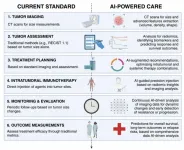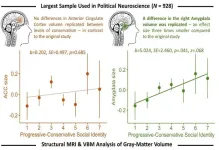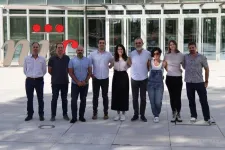Genetic factors underscore disparities in colorectal cancer survival
Patients with colorectal cancer have varied overall survival, but it remains unclear how the frequency of certain gene mutations among different racial and ethnic groups influences outcomes. To investigate, researchers led by John Paul Shen, M.D., and Mahmoud Yousef, M.D., analyzed data from over 47,000 patients with colorectal cancer treated at MD Anderson. They found that Black patients had poorer survival outcomes compared to white patients, especially in cases of metastatic disease. Black patients had higher rates of APC, KRAS and PIK3CA mutations, while white patients had higher rates of BRAF and KIT mutations. Importantly, these genetic differences contributed to the observed survival disparities. Socioeconomic status was the largest factor contributing to the survival gap but accounted for only 29% of the disparity. These findings highlight the importance of understanding how both genetics and socioeconomic status can affect patient outcomes. Learn more in JAMA Oncology.
Insights into NK cell dysfunction in advanced AML and MDS offer new therapeutic opportunities
Relapsed/refractory acute myeloid leukemia (AML) and myelodysplastic syndrome (MDS) are challenging malignancies with poor prognoses, emphasizing the need for innovative treatments. A new study led by May Daher, M.D., uncovered key mechanisms by which myeloid blasts – abnormal blood cells found in MDS and AML – evade the immune system, opening new options for therapeutic intervention. The researchers discovered that natural killer (NK) cells from patients with AML and MDS exhibit dysfunction, including impaired cytotoxicity, altered metabolism and exhaustion signatures. Although myeloid blasts initially are susceptible to NK cells, they eventually evade immune surveillance through direct contact, triggering TGF-β activation and NK cell dysfunction. Targeting the TGF-β pathway early can prevent NK cell dysfunction, but once established it becomes irreversible. These findings highlight the potential for therapies that prevent immunosuppression of NK cell therapies, offering hope for more effective treatments in AML and MDS. in Science Translational Medicine.
Novel biomarker may predict treatment response in small cell lung cancer
Patients with small cell lung cancer (SCLC) face a poor prognosis, partly due to a “cold” tumor immune microenvironment (TIME) that limits immunotherapy responses. To provide further insights, researchers co-led by Jianjun Zhang, Ph.D., Alexandre Reuben, Ph.D., and Carl Gay, M.D., Ph.D., used single-cell RNA sequencing and digital spatial profiling to analyze 132 tissue samples from 44 untreated patients with SCLC. The study mapped over 18,000 genes and 60 key immune proteins related to cancer genesis and progression, showing that immune cells within tumors vary significantly within different regions of the same tumor, affecting their infiltration and interactions. Innate immune cells and impaired B cells were more common in tumor areas, while monocytes and macrophages were likely involved in regulating the immune response. More importantly, the study found the RE1 silencing transcription factor (REST) protein, which controls neuronal transcription, was associated with low neuroendocrine factors and better immune response. The study highlights REST as a potential novel biomarker for SCLC to stratify patients and improve treatment responses. Learn more in Cell Discovery.
Pancreatic cancer subtype without KRAS mutations has unique tumor environment
Most patients with pancreatic cancer harbor KRAS mutations, but little is known about how this cancer develops and progresses in cases with non-mutant KRAS. Therefore, researchers led by Yang Chen, Ph.D., engineered lab models without specific genes – p53 and SMAD4 – to generate spontaneous pancreatic cancer development without KRAS mutations. Tumors in these in vivo models had the unique features of pancreatic adenosquamous carcinoma, a rare and aggressive subtype composed of a mix of adenocarcinoma and squamous cells. Single-cell sequencing revealed these tumors also had a distinct tumor immune microenvironment (TIME) compared to that of KRAS-mutant pancreatic cancer. Characterizing this TIME highlighted potential therapeutic targets for developing tailored treatments, which could be more effective for patients with non-mutant KRAS pancreatic cancer. Learn more in Cell Reports Medicine.
Strategy reduces need for blood transfusions after stem cell transplantation
Abnormal uterine bleeding in patients with hematological malignancies leads to an increased need for blood transfusions. Researchers led by Alessandra Ferrajoli, M.D., aimed to standardize and improve the prevention and treatment of uterine bleeding among these patients during hematopoietic stem cell transplantation (HSCT). The team created an algorithm to guide clinicians in the administration of leuprolide, a drug used to treat endometriosis and fibroids, with or without oral contraceptives. The retrospective study examined outcomes in 272 premenopausal patients with hematological cancers who received either no medications or leuprolide prior to undergoing HSCT. Patients receiving leuprolide with or without oral contraceptives were given 1.2 times fewer platelet transfusions and 1.1 times fewer red blood transfusions, respectively, compared to those receiving no medications. The study highlights the success of the algorithm as a way of standardizing the prevention and treatment of uterine bleeding to reduce the need for blood transfusions. Learn more in JCO Oncology Practice.
MD Anderson at ESMO 2024
Read below for highlights from MD Anderson researchers at the 2024 European Society for Medical Oncology (ESMO) Congress. More information can be found at MDAnderson.org/ESMO.
Combination therapy reduced agitated delirium in patients with advanced cancers Novel ADC AZD8205 demonstrates manageable safety profile and preliminary efficacy in first-in-human trial MD Anderson Research Highlights Special Edition: ESMO 2024 In case you missed it
Read below to catch up on recent MD Anderson press releases.
Novel triplet regimen yields promising response in advanced-phase chronic myeloid leukemia MD Anderson and Rice launch initiative to advance cancer-focused operations research MD Anderson Research Highlights Special Edition: 2024 World Conference on Lung Cancer Read this press release in the MD Anderson Newsroom.
- 30 -
END






